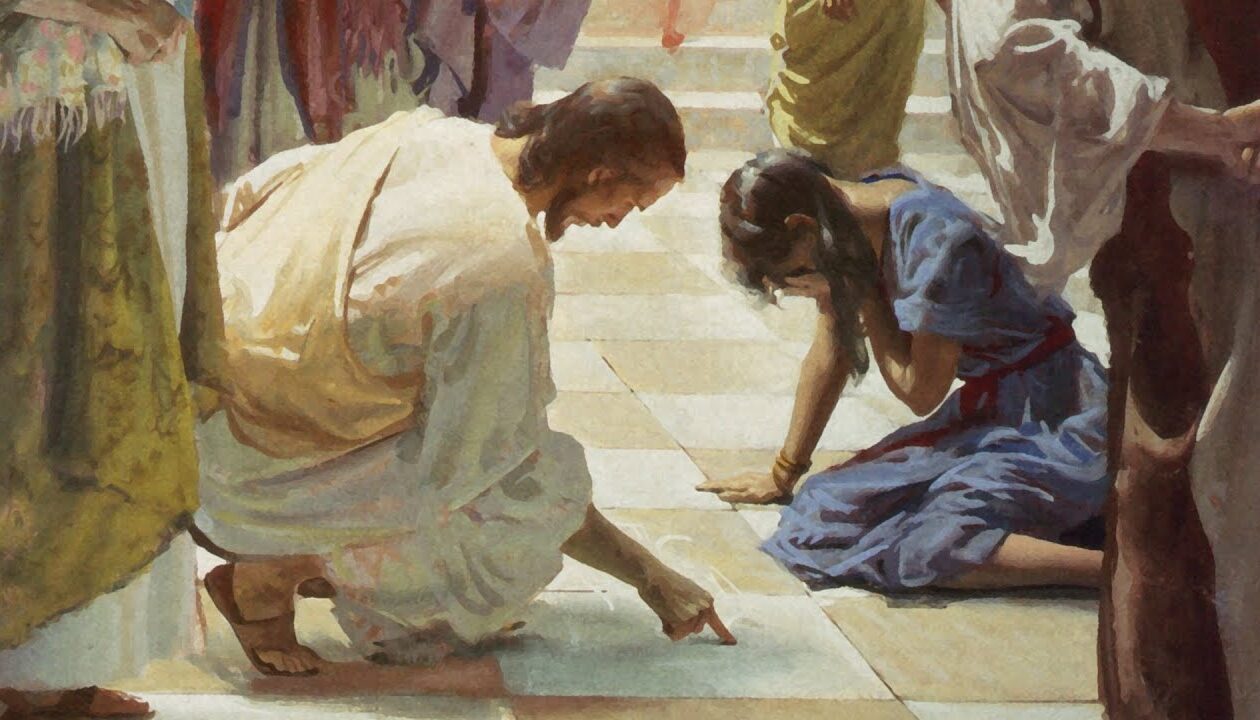
“Let anyone among you who is without sin, be the first to throw a stone at her”
Last Sunday, we listened to the parable of the Prodigal Son more appropriately called the parable of the Compassionate Father. This Sunday Jesus has an encounter with a woman who was caught in the act of adultery.
Now the scribes and Pharisees, mentioned in today’s gospel, were greatly shocked when they found this wretched woman taken in such open sin, and very indignant against her. They saw Jesus teaching in the temple and they were also out to get him. They sense an opportunity to kill two birds with one stone – so to speak. They drag her into the temple and force her to stand in front of the crowd in order to catch Jesus in an act of heresy so they can kill him. It’s shocking because first of all these so-called religious leaders are planning to kill someone, and second they are going to kill someone right there in the holy sanctuary. They announce that they caught this woman in the act of adultery, but notice that the man who would have also committed adultery was not brought forward. That’s because women were not considered fully human by these sexist, patriarchal men. Women were blamed by men for the problems of men, and the only solution was the death penalty, in the name of God, right there in the house of God.
Jesus’ response is totally shocking. By bending down and writing on the ground in the face of a hostile mob, he drew their attention from their anger and righteous indignation to his scribbling and thus distracts them so that they can hear his answer. Finally, He stands up and issues one of the greatest commandments in the Bible: “Let the one without sin be the first to throw a stone.” He not only condemns the death penalty, he points out the sinfulness within each one of us. I would also note that according to my limited understanding of Mosaic Law, if any one witnesses an act of adultery, they too are guilty and should be condemned to death. The elders remember this and are ashamed and walk away first. Jesus actually saves not only the woman, but the lives of the Scribes and Pharisees.
People should realize that it is not by comparing ourselves with others that we should judge, but by comparing ourselves with God.
It is in that way we will find that we are all sinners – we are all guilty. We should not be so focused on finding someone that is worse than ourselves but rather be anxious to know whether it is possible that God – before whom we know we stand condemned, can pardon or forgive us.
Any way, we can be grateful that the story is included in the gospel because:
- It involved the second chance, i.e., a gift of added time and the opportunity for the woman to live her life differently. He affirmed that human beings have a future as well as a past.
- It involved pity, or, better yet, compassion. While others condemned and judged, Jesus sought to understand.
- It involved challenge. Far from dismissing the gravity of the woman’s sin and its consequences, Jesus called her to become her best self, the self that was a clearer reflection of the God in whose image she had been created.
- It involved belief in human nature and in the as yet untapped potential for goodness in the woman.
- It involved warning. The story of the unnamed adulteress reminds us that we stand beside her, rightly accused of sin. Whether it is adultery or apathy, pride or prejudice, greed, envy or lust, her story confronts us with a choice. Do we accept the second chance and challenge Jesus offers? Do we dare to come away from our Lenten encounter with Jesus and live differently or not?
If we only heard that God was just, then there would be no hope for any of us. But he is “a just God and Savior.” He can condemn; the only question that remains is: CAN HE PARDON?
To the woman in the gospel, everything rested on his word. To us, everything rests on His word. What would He say? What would He do?
“Neither do I condemn you. Go your way, and from now on do not sin again.”
If any of us desire to have God’s full and free pardon, it must be our plan to stand first as the guilty sinner – To be alone with Jesus, consciously condemned – to have no one else to trust; no one else to compare ourselves to. Not to make resolutions of amendment, not to try to get better first, before you come to Him… but to make our very guilt the reason of being alone with Him.
And the Lord gives no conditional discharges. He did not say “Neither will I condemn you, if you will not sin anymore. No – He gives her full and complete forgiveness first. It is that forgiveness that will enable her to avoid sin in the future.
The truth is we are all sinners and so we are all loved and forgiven.
I would challenge each of us to reflect on who we want to throw stones at, who we want to condemn, how we might follow Jesus in the way of compassionate love – the way of the cross.
The story of the woman caught in the act of adultery portrayed Jesus as a man full of mercy, love, grace and forgiveness. The Scribes and Pharisees called Him a friend of sinners because He defied the religious conventions of His day by mixing with the outcasts and sinners of society. He reached out to them with love and compassion. He poured out His love and forgiveness upon them.
May the Eucharist that we will soon receive give us the strength to be merciful to others.
-Dcn. Terry Murphy

